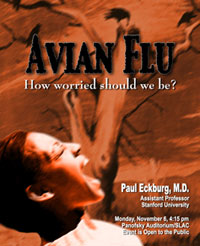

Friday - November 3, 2006
SLAC Today is
available online at:
http://today.slac.stanford.edu
In this issue:
Avian Flu: How Worried Should We Be?
symmetry: Packing it in
Recent Spam Increase
 |
 |
|
Friday - November 3, 2006 |

Image courtesy of SLAC InfoMedia. Avian Flu: How Worried Should We Be?Avian influenza has made headlines around the world since 2003, when a severe form of the virus began spreading rapidly throughout Asia, infecting humans and decimating the poultry industry. Meanwhile, some experts warn of the virus' potential to cause a pandemic. But just how concerned should we really be about avian influenza? In Monday's colloquium, Paul Eckburg, Clinical Assistant Professor in Infectious Diseases at Stanford, will provide perspective on the realities of this virus and its potential public health impact in the United States. His presentation will explain the differences between avian and seasonal influenza, provide a historical look at avian influenza outbreaks in humans, and describe how local and state governments are preparing to handle this virus. The colloquium takes place Monday at 4:15 p.m. in Panofsky Auditorium. All are invited to attend. |
||
|
|
||
symmetry: Packing it in
Physicists are regularly dashing all over the world for collaboration meetings, conferences, lectures, and summer schools. Trying to contact them to ask about their travels invariably yields the same response: "I can't talk right now. I'm traveling." Once they're finally pinned down, their travel tales extend to the most exotic realms. "When I was younger, like nine or 10, I used to read National Geographic a lot," says Barry Barish, now the Director of the Global Design Effort for the International Linear Collider. "I remember reading about Antarctica and Lake Baikal in Russia. Then, as a physicist, I got a chance to visit those places. I went to Antarctica because I am on the board of the National Science Foundation, which supports several Antarctic research projects, including the neutrino experiments, AMANDA and Ice Cube. The scenery was amazing—makes the Grand Canyon look like, well, I don't know, but not as special as we think of it. Lake Baikal was amazing, too. The Lake Baikal Neutrino Telescope experiment places detectors at the bottom of the lake. In winter, they cut holes in the ice in order to lower the detectors." Albrecht Karle of the University of Wisconsin-Madison says, "Whenever I go to Antarctica for Ice Cube, I always pack my own coffee, coffee maker, and some chocolates. They don't have chocolate down there, and they make awful coffee." Read more... |
Recent Spam Increase
You have probably seen a sudden increase in the number of spam e-mails making it into your inbox. We believe this is due to a shift in the spamming industry to use existing "botnets" (groups of compromised machines actually being controlled by a bad guy) to deliver the spam. As you may recall from Heather Larrieu's talk at September's Annual Security Briefing, botnets are being used in many money making schemes. We often see waves of new spam make it through SLAC's spam filter for a while until the vendor develops methods to catch up with the spammers' latest tricks. Our spam gateways have been catching much more spam recently, but we acknowledge you have likely noticed an increase nonetheless. The most recent trend is to use random text in the e-mail body and to attach a picture (which is the spam message).
Some standard good e-mail practices: Information on plain text is available here. Instructions for subscribing to a plain text version of SLAC Today can be found here. If you have any questions, contact the SLAC e-mail administrators at mail-admin@slac.stanford.edu. |
Events (see all | submit)
Access (see all)
Announcements
|
| | ||
|
|
||
 <%
Response.AddHeader "Last-modified", getArticleDate()
'Response.AddHeader "Last-modified","Mon, 01 Sep 1997 01:03:33 GMT"
'Monday, December 06, 2010
%>
<%
Response.AddHeader "Last-modified", getArticleDate()
'Response.AddHeader "Last-modified","Mon, 01 Sep 1997 01:03:33 GMT"
'Monday, December 06, 2010
%>View online at http://today.slac.stanford.edu/. |
||